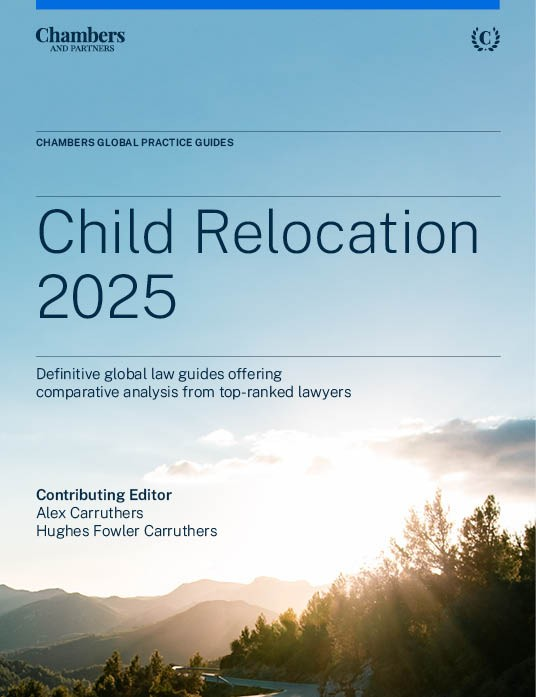
Child Relocation 2025
The Child Relocation 2025 guide features 15 jurisdictions, spanning Europe, the Americas, Asia, Africa, Australia, and the Middle East. The guide provides the latest legal information on whose consent is required for child relocation, the possibility of relocation without full consent, applications to state authorities for permission to relocate, relocation within a jurisdiction, the steps taken to return abducted children, and the role of the Hague Convention. The guide also covers parental responsibility, particularly as it applies to birth parents and non-genetic parents, the relevance of marriage, and the treatment of same-sex relationships in this area.
Last Updated: September 09, 2025
Compare law and practice by selecting locations and topic(s)
Select Locations

Select Topic(s)

Please select at least one location and one topic to use the compare functionality.
Global Overview of Child Relocation in 2025
Another year has passed with a large number of relocations having taken place around the world. When a marriage or other form of intimate relationship breaks down, one or both parties may want to make a change in their lives. For some, this may mean returning to their home country, starting afresh in a new country, pursuing a new relationship or seeking out a particular employment opportunity. Due to the rise of globalisation and cross-cultural relationships, one parent’s desire to relocate, either internally within the same country or internationally, is arguably becoming an increasingly prevalent issue across many jurisdictions. Any relocation has monumental implications for the children of divorcing or separated couples; therefore, the parent seeking to move should carefully consider their plans and how a relocation could be achieved, both with and without the other parent’s agreement, before pursuing it.
Internal and international relocation
For those seeking to relocate, returning “home” to the country they came from (often to gain a support network of family and friends living there) and forging a new relationship with someone from another country are common reasons for doing so. In deciding between countries, a compromise must be reached about where to live. Even once a decision is reached, it might then become necessary to relocate for work – a factor that still disproportionately affects men.
In international families, one party will often have to live in the country of the other. When they split up, the decoupling process works in reverse, and this potentially makes the issue of relocating children more acute. Obviously, these issues do not just affect the nuclear family – they also apply to blended families and in the case of adopted children, where different considerations may apply from country to country. The decision of whether or not to relocate with a child following the breakdown of a marriage or relationship can be an incredibly difficult one to make.
The laws relating to relocation differ between different jurisdictions. In many countries, such as England and Wales, a parent cannot relocate with a child (whether internally or internationally) unless the other parent consents or there is a court order permitting the relocation following contested proceedings. In other countries, such as the USA, there are different legal jurisdictions within the same country. The laws in some states presume that a custodial parent has the right to change the residence of a child unless the other parent can provide evidence to convince the court that such a move would be detrimental to the child, whereas other states first require consent or a court order. This can make it very difficult for one party to leave the state and move elsewhere in the country.
The family courts have long recognised relocation cases as some of the most contentious and difficult matters which they have to deal with. Judges regularly comment upon just how difficult such cases can be to determine, given that they are often finely balanced and the potentially devastating impact their decision may have on the unsuccessful party. Notwithstanding the complexities that arise, the number of such cases continues to increase for the reasons identified above. Given that the process can be slow and sometimes cumbersome in some countries, timing is very important so as to avoid unnecessary delays, and, for the parent seeking to relocate, any opportunity that arises to negotiate and to try to reach an agreement with the opposing parent, either before or during the course of proceedings, should be taken. Conversely, delay often suits the parent opposing the relocation. When trying to reach an agreement, the parent seeking to relocate should, where viable, invite the other parent to also relocate and offer generous contact proposals.
Although the key considerations typically remain the same, different jurisdictions vary in how they balance the right of the primary carer (often the mother) to go to a place where she would prefer to be against the change to the child’s relationship with their father. In trying to achieve the right balance between the two, the law may be a blunt instrument – given that the factual narrative of each relocation case is, by definition, unique and distinctly human. It can also be a costly exercise involving multiple hearings within lengthy proceedings.
Choosing to use the courts to deal with issues relating to children can be a bit of a sledgehammer and an expensive one, too – requiring people to spend their hard-earned savings on trying to ensure that they will see their child again or potentially prevent the child from moving to another country. Whether individuals can afford good legal counsel will depend on their financial situation or whether legal aid is available in their country. In some countries, relocations can be resolved out of court through avenues such as mediation or arbitration.
The key consideration in such cases is often the welfare of the child. The weight placed on such issues and evaluating what is in the child’s best interests will depend on the jurisdiction. In England and Wales, where the same welfare approach applies to internal and international relocations, the courts must weigh up various factors under a welfare checklist, such as:
- the child’s wishes and feelings;
- the child’s sex and background;
- the child’s physical, emotional and educational needs; and
- the likely effect on the child of a change in circumstances.
This list is non-exhaustive. Careful preparation of written evidence and credible contact plans facilitating frequent contact between the opposing parent and child are key aspects of any relocation application. If the parent seeking to relocate can afford to pay for at least some return flights for themselves and the child, so the child can spend time with other parent, they should offer to do so. The court must be convinced that the relocation is one that the applicant parent genuinely believes to be in the best interests of the child, rather than motivated by a desire of one parent to “get away” from the other and to marginalise the other’s role in the child’s life.
The age and maturity of the child or children will often be a key consideration in jurisdictions that take account of their wishes and feelings. The impact on the child is likely to increase with age – for example, a 15-year-old is typically more able than a five-year-old to articulate and express their desires about their relationships with their parents. However, the amount of weight given to the child’s views can vary in different jurisdictions, and one aspect with which the courts have to regularly grapple is whether the expressed wishes and feelings of a child represent their own independent voice or whether they are, for whatever reason, stating what they think one parent wants to hear. Where different children express strongly different wishes, this might result in families/siblings being split up.
The courts will also consider other factors such as the potential harm that could be caused to the primary carer of a child who is refused permission to relocate. It is widely accepted that it is important for a child to have a relationship with their non-resident parent; however, it is similarly important for the child to have a principal carer who is psychologically stable and emotionally well. The court will likely be concerned for the primary carer if they assert that they are lonely and isolated with no support network in the country where the parties are living, although this is just one aspect amongst many others that the court will need to consider, including the sense of loss and psychological impact the opposing parent may suffer if the relocation is permitted. If one party has been found by the court to have been physically, verbally or psychologically abusive towards the other, both during the relationship or post separation, it is possible that this too may play a role in the decision it makes on a proposed relocation.
Practical considerations, such as the size of a country in an internal relocation and the distance between the two countries in an international relocation can also be significant. Moving from one side of Australia to the other, for example, could have a distinct impact on a child, but less so on a child moving 30 miles away. Travelling times can also be material. It may well be quicker and easier for one person to travel from London to visit another in Paris than it is to go to Northumberland.
Post-Brexit, the UK is no longer subject to EU regulations. Potential issues might therefore arise in relation to an order previously made by an EU country in terms of enforceability. Equally, the removal of freedom of movement now makes it harder for people (particularly EU citizens) to spend significant time in the UK. Immigration has also become a more challenging issue in the UK, which makes some practicalities more difficult, whereas movement within the EU remains straightforward. Specialist immigration advice is often essential before issuing relocation proceedings, as is taking all the necessary steps so far as possible to secure the relevant visa or visas prior to any final hearing.
The Family Procedure Rules in England now require parties to consider non-court dispute resolution before issuing private law applications relating to children. This pre-action protocol applies to parties wishing to make a relocation application, and it is therefore important to get advice at an early stage. The court also has the power to adjourn court proceedings if it considers that the parties have not engaged in non-court dispute resolution when they should have. Given the binary nature of relocation disputes, resolution through mediation is rare, but not impossible. For those who can afford the cost of a private arbitrator, arbitration offers a fast-track approach to receiving a determination.
Child abduction
Where permission to relocate is not obtained (whether through the court or otherwise), the relocation of a child can result in child abduction. This is a criminal offence in many countries, and the child’s return will often be governed by the terms of the Hague Convention of 25 October 1980 on the Civil Aspects of International Child Abduction (the “1980 Hague Convention”), a multilateral treaty relating to international child abduction and supplemented by the Hague Convention on parental responsibility and protection of children (“HCCH 1996”). As of 2025, there are 103 parties to the 1980 Hague Convention, including most Western countries and many others that have internationally recognised legal systems. Some countries, including India, Bangladesh and the UAE, are not signatories to the 1980 Hague Convention. Certain countries that are signatories (eg, Russia, Turkey and Mexico) may not always demonstrate compliance. This guide aims to provide some understanding of the broad principles that apply in such cases. In reality, the application of the 1980 Hague Convention within countries that are signatories will differ, as will the length of time taken to deal with such cases.
The 1980 Hague Convention protects children from the harmful effects of abduction (ie, wrongful removal and retention across international boundaries) by a parent. It encourages the prompt return of abducted children to their country of habitual residence and provides a procedure to bring about their return.
The 1980 Hague Convention essentially operates on the principle that if there is a relocation without the consent of both parties, the child should be returned to the country from which they were taken, and any decisions about the child’s future residence and living arrangements should then be taken in that country. The existence of the 1980 Hague Convention demonstrates that the international community recognises the scale of the problem and the pressing need for a mechanism for returning children.
Parents are best advised to act quickly to prevent an abduction if they believe that their child may be at risk – for example, by obtaining an order preventing removal where available. Once a child has been wrongfully removed, the legal mechanisms for forcing a return can be protracted and require applications in various jurisdictions. It is better to act pre-emptively to avoid this difficult, lengthy and expensive process.
Relocation applications are only going to become more frequent in our increasingly interconnected world and are something that parents and the courts in different jurisdictions are going to have to deal with.


